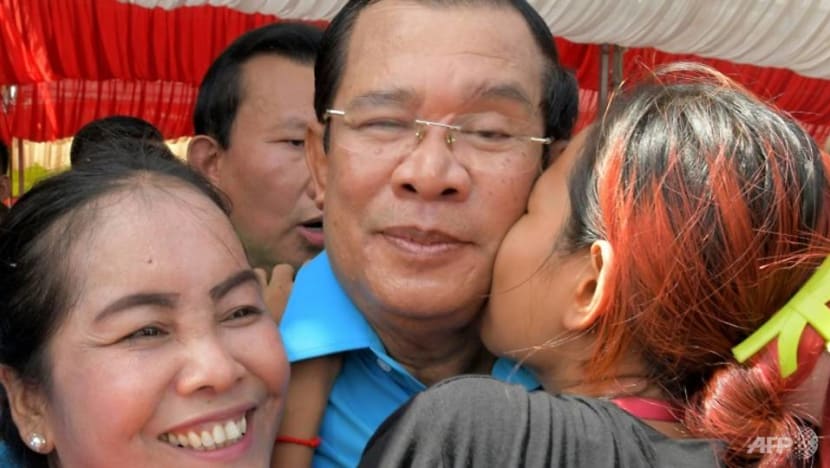Hun Sen’s speech mania: Why the Cambodian leader is campaigning for an unloseable election

A garment worker kisses Cambodia's Prime Minister Hun Sen during a ceremony at a compound of factories in Phnom Penh. (Photo:AFP/Tang Chhin Sothy)
PHNOM PENH: When the Cambodian Prime Minister makes a speech he demands an audience. And for the past six months, Hun Sen has swept the nation with words of feeling and fury: Regular, targeted and somewhat repetitive, directed at hundreds of thousands of the country’s working urban class.
He has embarked on an oratory campaign of self-promotion and criticism of his political enemies – namely the banished national opposition and, increasingly, the United States.
The ruler of three decades has now seemingly tirelessly made some 35 speeches – typically lasting well over one hour- to reported crowds of workers and employees totalling more than 400,000 since late August.
Phal Kunthea, 37, a garment worker in Phnom Penh attended one in September last year; like most, she was paid a token sum of money to listen and was heartened by the goodwill on display to the women who power the country’s most important industry.
In these addresses, Hun Sen presents himself as the illuminated pedagogue, a grandfather of the state demanding and deserving of the reverence of the people. He assures the humbled that he cares, that he too carries their grievances and has the power to ease their struggle. With the same hand, he lambasts and derides those who would criticise his intentions or actions, often surprising spectators with the ferocity or obscenity of his language.
“Before, he did not seem interested in workers. Now, he encourages workers and he said that he felt happy to see us,” Kunthea said.
Garment workers, a restive working class no longer bound to the land, emerged as a powerful voting faction that nearly delivered government to the Cambodia National Rescue Party (CNRP) in 2013. Its leader at the time Sam Rainsy exploited their struggle to whip up the conditions for possible electoral change.
It was a moment that nearly humiliated Hun Sen and one he has been waiting to avenge ever since, according to policy analyst Ou Virak, the founder of Future Forum in Cambodia.
“Number one is redemption for Hun Sen after the hit in 2013. He will be calculating how to stay in power and seeing who he has to neutralise but also deep down he wants to be not just loved, but revered,” he said.
No leader can ride out a nation’s years of crippling war and humming prosperity alike for more than 32 years as its sole, dominating figurehead without being skilful and shrewd. This is professional electioneering from a seasoned politician.
Yet the upcoming national vote is poised to be nothing but a walkover for the country’s ruling party – the Cambodian People’s Party (CPP). Hun Sen could feasibly disappear from public life between now and July and the public would still be left with no viable alternative but to vote for him.
Still the 65-year-old continues to defy the heat to meet the masses.
'THE KING DOESN'T MOVE - HE'S ALL OVER THE BOARD'
The prime minister understands the contained clout of the garment workers and is looking to appease them via a charm offensive to “acclimatise people to the new period of de-facto one party rule, which is now emerging”, said Sebastian Strangio, author of “Hun Sen’s Cambodia”.
“He’s pivoting towards a campaign of Hun Sen-style public outreach, addressing public concerns and communicating that the CPP has a firm hand on the tiller and looking out for ordinary people,” he added.
“The CPP is going to realise that they can resolve the CNRP but what they can’t resolve is public desire for change and political reform. This is really vital if the CPP is to remain in power in the long term.
“Even if your elections are reduced to a meaningless electoral exercise, you need to be aware of public sentiment and this is Hun Sen’s way to gauge and manage it,” Strangio said.
Hun Sen has not been public-shy throughout his rule, but since 2013 his public appearances have been inconsistent as he pushed himself on social media. His Facebook page is still widely influential with a following of nearly ten million accounts, all of which can livestream his regular public events.
While Strangio believes the tone of the speeches “counteract his attempts to soften his image over the past few years”, Virak says the constant appearances create a risk of his omnipotent image losing its influence on the Cambodian people.
“The only danger is when you play Cambodian chess, the king doesn’t move. You don’t want the king to move too much. He’s all over the board, he’s everywhere now. That’s the only problem with the way we see leadership,” he said.
The government sees the prime minister’s direct intervention in the selling of policy making, explaining and justifying as invaluable to its ambitions to bring prosperity to the country, not an unashamed political tactic.
“This is not a political contest. It is a promoting workers to be valuable in the society,” said government spokesman Phay Siphan.
“We don’t just sit and wait until protests happen and then solve the problem. We don’t use the workers as political hostages. We solve problems for workers to make them become people with dignity, recognition and respect.”
“When they have good living conditions, I think that even if there is incitement from the opposition, it won’t be effective,” said CPP spokesman Sok Eysan.
The outlawed opposition party, whose members are in hiding or scattered in other parts of the world does not agree.
"Hun Sen shows all signs of paranoia and see his enemies coming from all sides. He knows half of the country wants change," said Mu Sochua, the CNRP's deputy leader, currently in exile overseas.
"The opposition created the workers’ movement and he knows workers have access to Facebook and still remain politically tied to opposition. He is buying votes."
Peace is a constant theme that Hun Sen uses to solicit admiration and fear – pivotal reminders that is was him alone that brought an end to the terrors of the Khmer Rouge regime. And he claims he is doing the same by expunging nefarious opposition forces controlled by foreign powers from the country now.
And while the intended audience for this message is more than just the thousands seated on plastic chairs swatting away flies outside their factories, their response to Hun Sen is important if he is to receive the absolutely popular mandate he craves and defuse future trouble.
“If we are satisfied with him, we will vote for him but if we aren’t satisfied we won`t vote for him. No-one can force us,” said garment worker Phen Nuon.
Others like Phal Kunthea are more resolute in their resistance if words do not translate to improved lives.
“New things are always better than the old ones,” she said. “This time, people aren’t scared anymore. When people became very desperate, one day, they will stand up.”












